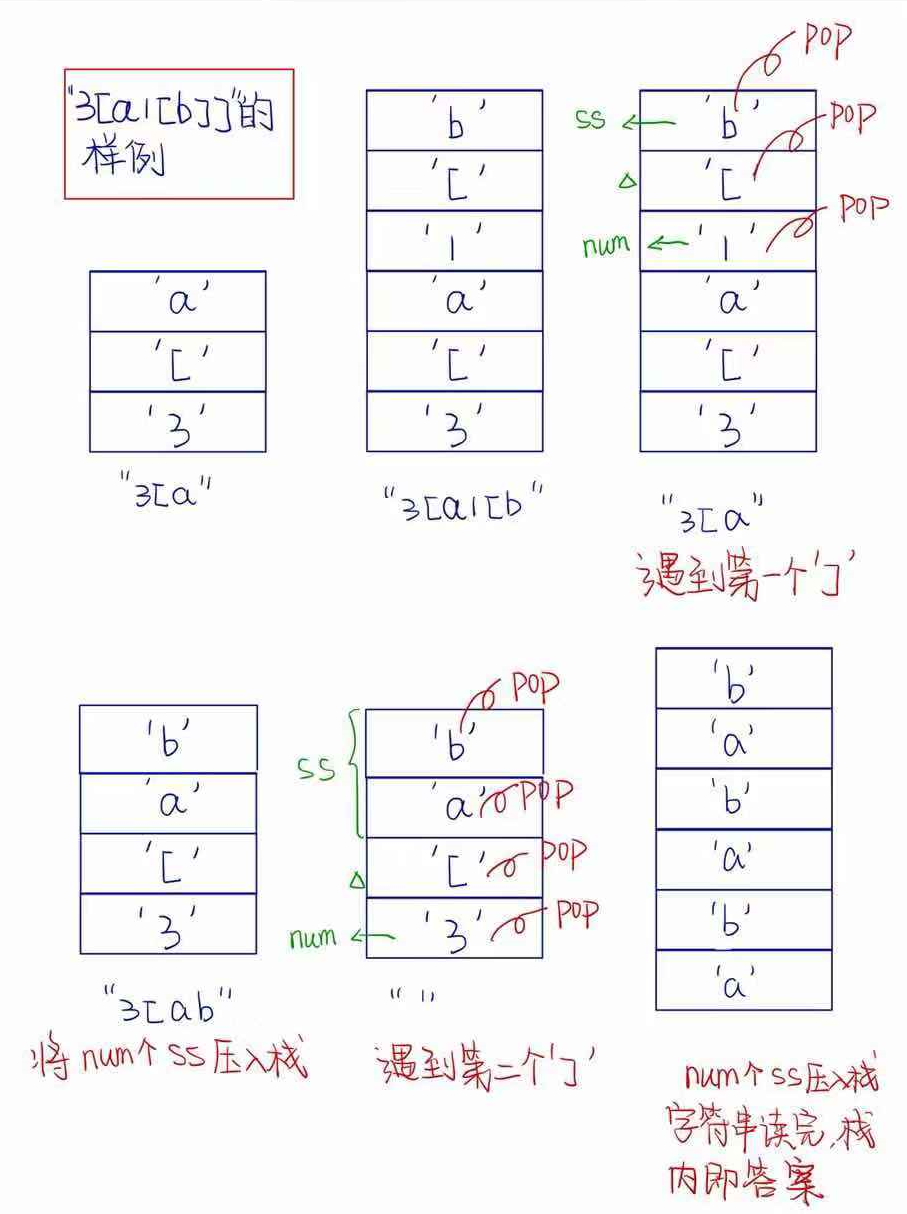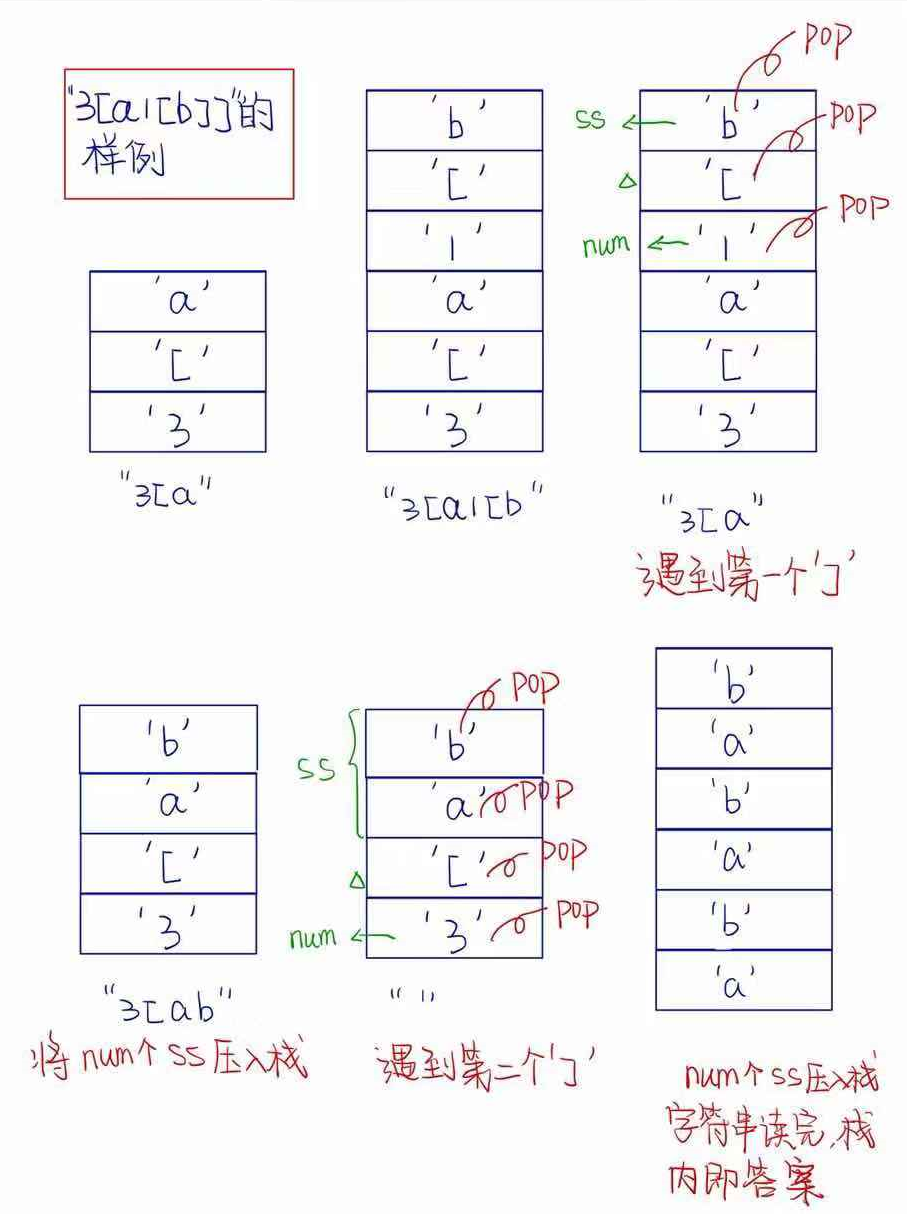[Leetcode]394.字符串解码
题目与解释
给定一个经过编码的字符串,返回它解码后的字符串。
编码规则为: k[encoded_string],表示其中方括号内部的 encoded_string 正好重复 k 次。注意 k 保证为正整数。
你可以认为输入字符串总是有效的;输入字符串中没有额外的空格,且输入的方括号总是符合格式要求的。
此外,你可以认为原始数据不包含数字,所有的数字只表示重复的次数 k ,例如不会出现像 3a 或 2[4] 的输入。
示例:
s = "3[a
]2[bc]", 返回 "aaabcbc".
s = "3[a2[c]]", 返回 "accaccacc".
s = "2[abc]3[cd]ef", 返回 "abcabccdcdcdef".
解释:
这道实际上是一道字符串与栈结合的问题。如何看出是栈结合的问题呢?
- 有匹配('['和']')的情况,需要使用栈来完成匹配过程
- 有递归的情况, 如3[2[ab]]这样
在匹配符号上,我参照我之前写的小型计算器的符号匹配,遇到']'就去寻找最近出现的匹配符号'['。
思路
建立一个字符栈,这里用的是STL自带的stack<char>
逐个读入字符压入栈,当遇到']'符号就寻找最近的匹配符号。
这个寻找的过程就是不断判断栈顶是否为'['符号?
->否。这个是括号内的字符,暂时存入一个字符串ss
->是。则寻找到匹配的字符,继续往前寻找'['的字符前的所有"数字字符串",如34[22[ss]],那么22就是[ss]的数字字符串,34则是[22[ss]]的数字字符串。在寻找完后需要将这个字符串转换成实际的数字。
经过一次上述过程后,已经知道一个括号内字符串和这段字符串出现的次数k。我们把k个字符串压入我们创建的字符栈。
而当所有字符都读完了,则转换实际上就已经结束了。我们先根据思路写一段解法,但效率还不是很高。
我们看看"3[a1[b]]"的图例

class Solution {
public:
string decodeString(string s) {
string ans = "";
stack<char>st;
/*visit all the character in the string s*/
for (unsigned i = 0; i < s.length(); i++) {
if (s[i] != ']')st.push(s[i]);
else {
/*
if we find the character ']', it means we find a pair.
string ss means the string in the pair of this times.
string num means the number k in the pair of this times.
Initialize these two strings as an empty string.
*/
string ss = "", num = "";
while (st.top() != '[') {
ss += st.top();
st.pop();
}
/*Delete '[' character*/
st.pop();
/*reverse the string ss*/
reverse(ss.begin(), ss.end());
while (!st.empty() && st.top() <= '9'&&st.top() >= '0') {
num += st.top();
st.pop();
}
unsigned times = 0, index = 1;
for (unsigned i = 0; i < num.length(); i++, index =index* 10) {
times += index * (num[i]-'0');
}
string sss ="";
for (unsigned i = 0; i < times; i++) {
sss += ss;
}
for (unsigned i = 0; i < sss.length(); i++) {
st.push(sss[i]);
}
}
}
/* push the k times string to the stack st*/
while (!st.empty()) {
ans += st.top();
st.pop();
}
reverse(ans.begin(), ans.end());
return ans;
}
};
很暴力的按照思路的过程写了代码,优化点是可以自己写一个stack而不是使用STL的stack,使这个自己写的stack拥有遍历的方法。新增的内容有注释提示。能将上面代码优化4ms。
/*********added below*********/
class Stack {
public:
Stack() {
topNum = -1;
ll.clear();
}
void push(char c) {
ll.push_back(c);
topNum++;
}
char top() {
return ll[topNum];
}
void pop() {
ll.pop_back();
topNum--;
}
bool empty() {
return topNum == -1;
}
vector<char>ll;
private:
int topNum;
};
/******add above*********/
class Solution {
public:
string decodeString(string s) {
string ans = "";
Stack* st=new Stack();
for (unsigned i = 0; i < s.length(); i++) {
if (s[i] != ']')st->push(s[i]);
else {
string ss = "", num = "";
while (st->top() != '[') {
ss += st->top();
st->pop();
}
st->pop();
/*Delete '[' character*/
reverse(ss.begin(), ss.end());
while (!st->empty() && st->top() <= '9'&&st->top() >= '0') {
num += st->top();
st->pop();
}
unsigned times = 0, index = 1;
for (unsigned i = 0; i < num.length(); i++, index =index* 10) {
times += index * (num[i]-'0');
}
string sss ="";
for (unsigned i = 0; i < times; i++) {
sss += ss;
}
for (unsigned i = 0; i < sss.length(); i++) {
st->push(sss[i]);
}
}
}
/******change below********/
for (char it : st->ll) {
ans += it;
}
/******change above********/
delete st;
return ans;
}
};



 浙公网安备 33010602011771号
浙公网安备 33010602011771号